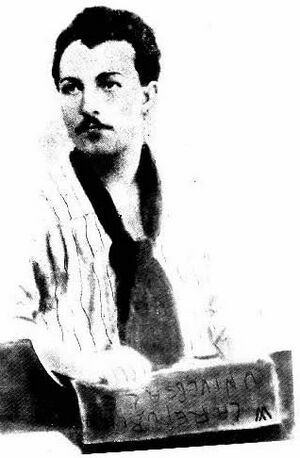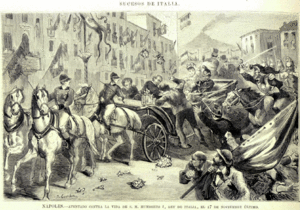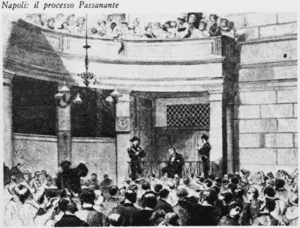Giovanni Passannante facts for kids
Quick facts for kids
Giovanni Passannante
|
|
|---|---|
 |
|
| Born | 19 February 1849 |
| Died | 14 February 1910 (aged 60) |
| Nationality | Italian |
| Occupation | Cook |
| Criminal status | Dead |
| Conviction(s) | Attempted murder of Umberto I of Italy |
| Criminal penalty | Life imprisonment |
Giovanni Passannante (1849–1910) was an Italian cook who became known for trying to attack King Umberto I of Italy. This was the first time someone tried to harm a king from the Savoy royal family since they began ruling. Passannante was first sentenced to death, but his punishment was changed to life in prison. The very harsh conditions of his imprisonment made him mentally unwell. Many people at the time said his treatment was cruel.
Contents
Giovanni Passannante's Story
The Attack on the King
After his father, King Victor Emmanuel II, passed away, Umberto I became the new king. He decided to travel around Italy to meet his people. His wife, Queen Margherita, and the prime minister, Benedetto Cairoli, joined him. They planned to visit Naples, even though there was a big debate about how much it would cost the city to host them.
On November 17, 1878, King Umberto I and his group were riding through Naples. Passannante was in the crowd, waiting for the right moment. As the king's carriage passed, Passannante pretended to ask for something. Suddenly, he pulled out a knife. He attacked the king, shouting, "Long live Orsini! Long live the Universal Republic!"
King Umberto I managed to block the knife, getting only a small cut on his arm. Queen Margherita quickly threw a bouquet of flowers at Passannante's face. She shouted, "Cairoli, save the king!" The prime minister grabbed Passannante by his hair but was also hurt in his leg. A captain named Stefano De Giovannini hit Passannante on the head with his sword. Passannante was then arrested. He had used a knife about 12 centimeters long, which he had traded his jacket for. The knife was wrapped in a red cloth that said, "Death to the King! Long live the Universal Republic! Long live Orsini!"
What Happened After the Attack?
The attack on the king shocked everyone in Italy. The government worried that anarchists, people who believe in no government, were planning more trouble. Passannante's actions led to unrest in many cities. Several people were hurt or arrested, and some even died. The day after the attack, in Florence, a group of anarchists threw a bomb. This happened during a celebration for the king's survival. Two men and a young girl were killed, and more than ten people were injured. Another bomb went off in Pisa, but no one was hurt there. In Pesaro, a military building was attacked.
Some important people, like Alberto Mario, spoke out against Passannante's actions. A poet named Giovanni Pascoli even read a poem about Passannante at a meeting. He later destroyed the poem, but one line is remembered: "With the cook's cap, we'll make a flag." This refers to Passannante's job as a cook. Pascoli and others were arrested for protesting against Passannante's harsh treatment.
Some newspapers spread false stories about Passannante. They claimed he was a criminal who had killed a woman. Others said his father was a member of a crime group. A few days after the attack, Prime Minister Cairoli's government was criticized for not keeping public order. Cairoli later resigned from his position.
Passannante's family was put in jail, but his brother managed to escape. The mayor of Passannante's hometown, Giovanni Parrella, went to Naples. He apologized to King Umberto I and asked for forgiveness. As a sign of this forgiveness, the king's advisors ordered Passannante's hometown to change its name. On July 3, 1879, it was renamed Savoia di Lucania, after the royal family.
Life in Prison and Death
During his trial in March 1879, Passannante said he acted alone. He explained that he felt the promises of the Risorgimento, a movement for Italian unity, had been broken. He also believed the government ignored how a new tax on flour was hurting poor people. Passannante was sentenced to death on March 29, 1879. However, the death penalty was usually only for actual killings of a king. So, his sentence was changed to life in prison.
He was sent to a prison in Portoferraio on the island of Elba, near the Tuscan coast. He was kept in a small, dark cell below sea level. There were no proper toilets, and he was completely alone. These very harsh conditions made his mental health much worse. He became very ill, lost his hair, and his skin changed color. His eyes were also affected by the lack of light.
In 1899, a politician named Agostino Bertani and a journalist named Anna Maria Mozzoni spoke out about Passannante's terrible treatment. This caused a big public outcry. Doctors examined Passannante and found him in very poor health. He was then moved to a mental hospital in Montelupo Fiorentino. However, the doctors there could not help him recover his mental or physical health. Giovanni Passannante died in Montelupo Fiorentino at the age of 60, just before his 61st birthday.
Filmography
- Passannante (2011), a film directed by Sergio Colabona. It stars Fabio Troiano, Ulderico Pesce, Andrea Satta, and Luca Lionello.
Images for kids




